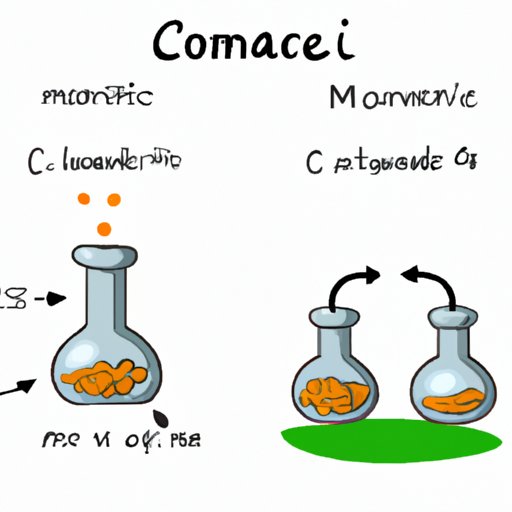
Introduction
Chemistry is a fascinating world of experimentation and analysis. However, many students and chemists struggle with one fundamental aspect of the field: converting moles to grams. If you find yourself struggling with this problem too, do not worry! In this article, we will provide a solution by exploring various approaches and tips to help you master converting moles to grams with ease.
Mastering Chemistry: A Guide to Converting Moles to Grams
To convert moles to grams, we must use the formula:
mass (in grams) = molecular weight (in grams/mole) x moles
Breaking this formula down step by step, we can first determine the molecular weight of the compound by adding up the atomic weights of all the elements within it. Once we have calculated this, we multiply this number by the number of moles and the result we get is the mass in grams.
Let us take an example. Suppose we want to convert 2 moles of carbon dioxide (CO2) to grams. First, we need to determine the molecular weight of CO2 which is 12.01 (the atomic weight of carbon) + 2 * 16 (the atomic weight of oxygen). This gives us a molecular weight of 44.01 g/mol. We can then multiply this value by 2 moles to get 88.02 g of CO2.
The Importance of Converting Moles to Grams in Chemical Reactions
Converting moles to grams is significant in the field of chemistry as it helps us quantify the amount of substance and reactants needed for a particular chemical reaction. Accurate conversions are essential for conducting safe and successful chemical experiments. Inaccurate measurements and conversions can lead to incorrect results, which may be hazardous to yourself and others around you.
It is, therefore, crucial to understand and learn the methods used to convert moles to grams accurately. There are various ways to do so, including using formulas and ensuring the use of appropriate conversion factors in calculations.
Knowing How to Convert Moles to Grams: A Must for Chemistry Students
For students new to chemistry, learning how to convert between different chemical units is vital. This includes the ability to convert moles to grams. Students will gain proficiency in this skill by understanding the formulas needed to perform the conversion, and by practicing applying them to various chemical compounds.
To convert moles to grams, students should first determine the molecular weight of the compound and then multiply the value with the number of moles. An essential tip is to ensure that the molecular weight units (g/mol) and the mole units (moles) cancel out, thus leaving us with the mass unit (in grams).
For example, suppose we have 1.5 moles of sodium chloride (NaCl) that we want to convert to grams. The molecular weight of NaCl is 58.44 g/mol; thus 1.5 moles of NaCl would be 1.5 x 58.44, which is equal to 87.66 g of NaCl.
Top 5 Tips for Converting Moles to Grams in Chemical Compounds
1. Rounding up: When dealing with decimals, rounding up to the nearest hundredth can help make the calculations easier and simpler.
2. Converting directly from the empirical formula: Another method is to use the empirical formula directly to convert moles to grams.
3. Remember the significance of the atomic weight: Knowing the atomic weights of the elements in the compound is vital when calculating the molecular weight, which is then used to convert moles to grams.
4. Always double-check your calculations: One small mistake in the calculation can lead to a significant error in the final result. Therefore, it is crucial to recheck and verify all the steps in the calculation.
5. Unit conversion is key: Be mindful of the units when converting between moles and grams. Ensure that they are equivalent and cancel correctly.
Quick & Easy Conversion: Shortcut Tricks for Finding Moles to Grams
While the above-discussed methods are more reliable and accurate, some shortcuts exist to find a quick and easy conversion between moles to grams.
One such method is using conversion factors. It involves multiplying the moles with the atomic weight of the compound, and the result is the mass in grams.
Another approach is using the periodic table. By listing the atomic weight and multiplying this with the number of molecules, we can find the mass in grams.
However, while these shortcuts are quicker, caution and precision are crucial if we want to obtain accurate results.
Conclusion
Converting moles to grams is a fundamental aspect of the chemistry field. Fortunately, there are various ways to master this skill, such as learning the formula, understanding the importance of accurate conversions, and following the top tips and tricks outlined in this article.
Therefore, practice is key, and we encourage readers to apply these techniques to diverse chemical compounds, experiment with them, and practice until they master this important skill in chemistry.




